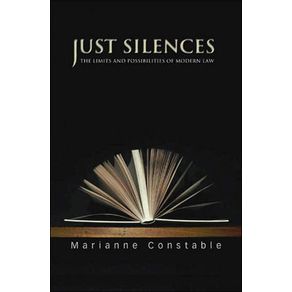Is the Miranda warning, which lets an accused know of the right to remain silent, more about procedural fairness or about the conventions of speech acts and silences? Do U.S. laws about Native Americans violate the preferred or traditional 'silence'of the people whose religions and languages they aim to 'protect' and 'preserve'? In 'Just Silences', Marianne Constable draws on such examples to explore what is at stake in modern law: a potentially new silence as to justice. Grounding her claims about modern law in rhetorical analyses of U.S. law and legal texts and locating those claims within the tradition of Nietzsche, Heidegger, and Foucault, Constable asks what we are to make of silences in modern law and justice. She shows how what shecalls 'sociolegal positivism' is more important than the natural law/positive law distinction for understanding modern law. Modern law is a social and sociological phenomenon, whose instrumental, power-oriented, sometimes violent nature raises serious doubts about the continued possibility of justice. She shows how particular views of language and speech are implicated in such law.



